5 Things You Need To Learn If You Want To Be Happy
Why happiness lies in day-to-day life details

Let's be honest: you've seen that there's a list of things in the title of this article, your brain is now probably going haywire and you're going to skip this boring introduction and get straight to the point. I don't blame ya. But the following paragraph is for you, the 0.01%, the rebels, the misfits, the crazy ones who will actually go through the entire article and maybe even leave a comment.
(Does Sir David Attenborough's voice)
For centuries mankind has been on a never-ending quest for happiness. From Buddha's "Happiness is the path" to Nietzsche's "Happiness is the feeling that power increases", it's clear that a lot of thought has been given and a lot of material has been written about what seems to be man's ultimate, supreme goal. Sadly enough, the harsh reality is that even though we're healthier, richer, and live longer compared to any other time in history, people are feeling worse and worse each year.
Although the reasons behind general unhappiness are many and hard to clearly identify, there are some things that you and I can learn to recognize, and manage, to put ourselves in a position where we can feel content and satisfied.
Are you ready? Let's go 🚀
* The following is NOT medical advice. I am not a doctor. (I am also not a cat) *

1 - Learn The Difference Between Pleasure And Contentment
Pleasure and contentment are strictly related to two very important neurotransmitters: dopamine and serotonin. Dopamine is the neurotransmitter behind the brain's pleasure and reward system: it's what motivates you to get out of bed in the morning, it's the rush you feel after completing a task, but it also plays a big role in getting people addicted to alcohol, sugar, cocaine, sex, and their cell phones. On the other hand, serotonin is a neurotransmitter that acts as a mood stabilizer and is associated with contentment.
Both when you feel content and when you feel pleasure, your brain is saying: "this feels good", which is why people tend to confuse these terms and mistake one for the other. While the general state of well-being is a key similarity, there are some crucial differences. When you feel pleasure your brain is screaming "I need more", whereas when you feel contentment it's telling you "I don't need anything else". This is where the problem lies. Because pleasure is followed by a desire for MORE, the substances and experiences that trigger it, lead to addiction, which naturally erodes our ability to be happy. Chemically speaking, it appears that low levels of serotonin can lead to an overproduction of dopamine, which in turn may lead to impulsive behavior. This is not to say that pleasure should have no place - it's actually quite the opposite - but we live in a society designed to make us chase pleasure at the expense of contentment. In his great book "The Hacking of the American Mind", Dr. Lustig highlights the main differences which are summarized in the following infographic.
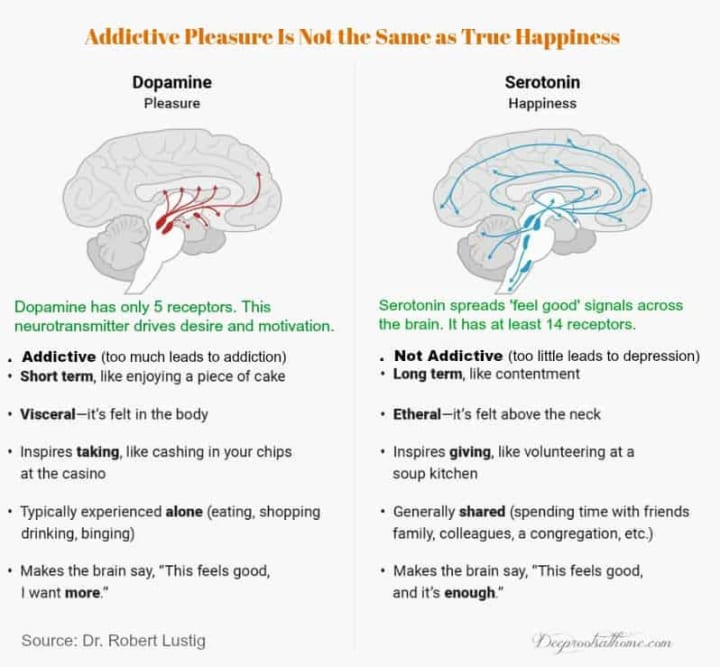
Key Takeaway: Pleasure and contentment feel similar but are radically different. Excessively seeking short-term pleasure can lead to addiction and prevent you from achieving long-term satisfaction.
Actionable Steps: Think about how much time and energy you spend chasing after pleasure (booze, sex, endlessly scrolling Instagram, eating chocolate…) vs how much you spend in activities that allow you to feel contentment (dinner with friends, volunteering, meditating, quality family time…). If you realize that the scale is heavily tipped in favor of pleasure, why not try to review your habits and take the initiative to allocate more time to pursuing long-term contentment.
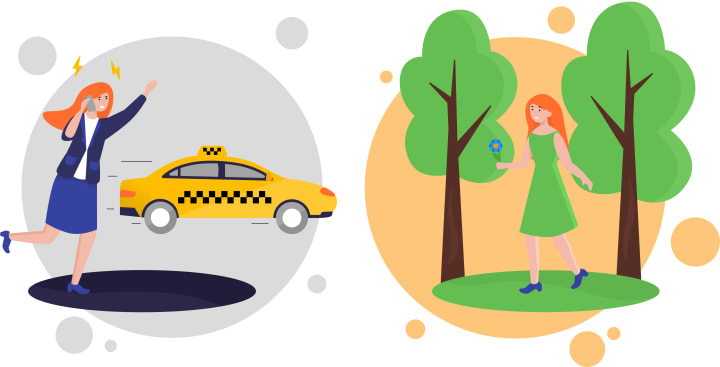
2 - Learn How To Manage Stress
Have you ever been in danger? Maybe thieves broke into your house, you were close to crashing your car, you were being chased by a wild animal or you were at the mall shopping and somebody eyed that last pair of Virgil Abloh's Off-White Nikes you so desperately wanted?
In all those situations, your body likely responded by quickly releasing cortisol, a crucial hormone for survival. Whenever you're under stress, cortisol helps you boost energy levels, stay highly alert, regulate blood pressure, and redirect its flow to fuel the brain, muscles, and heart. As soon as the threat has passed, your brain adjusts the cortisol level, and as adrenaline is restored back to normal, your heart rate and blood pressure return to baseline levels. Sadly, life in the 21st century can be filled with financial insecurity, taxing routines, conflicts, and traumatic experiences, all of which lead to a prolonged and sometimes chronic state of stress.
The result? It's really not much of a surprise that several studies show a correlation between stress and depression, heart disease, memory, and concentration impairments. All of which makes it really hard to be happy.
Key Takeaway: Our bodies are not designed to thrive under prolonged periods of stress, which can be a natural consequence of the frantic lifestyle many of us are forced to have.
Actionable Steps: There is no silver bullet able to eliminate stress in your life, as causes and situations differ. Many see great benefits when trying mindfulness exercises, 4–7–8 breathing, or simply walking in nature for 20 minutes can cut cortisol levels by 10%.
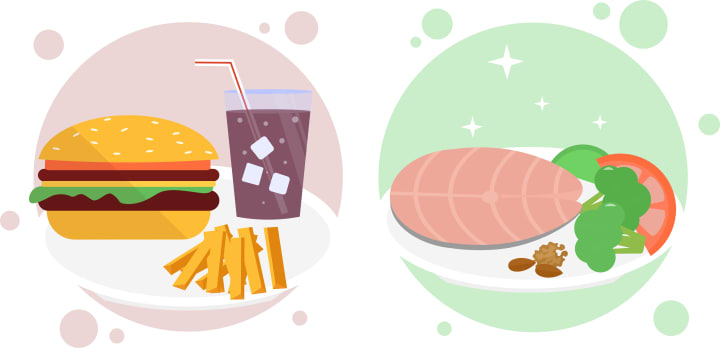
3 - Learn Which Foods Are Good For Your Brain
Even though we've been bombarded since childhood with sayings like "you are what you eat", highlighting the importance of a healthy diet, studies suggest that a staggering 20% of deaths worldwide are linked to poor diets. And it's of no wonder: we are hooked on caffeine, alcohol, and the cheapest dopamine provider, sugar. Dietitian Cassie Bjork states that sugar can be even more addicting than cocaine. Bjork says "Sugar activates the opiate receptors in our brain and affects the reward center, which leads to compulsive behavior, despite the negative consequences like weight gain, headaches, hormone imbalances, and more…. Every time we eat sweets, we are reinforcing those neuropathways, causing the brain to become increasingly hardwired to crave sugar, building up a tolerance like any other drug." Excessive sugar consumption is linked to higher blood pressure, inflammation, weight gain, and diabetes, all of which ultimately lead to an increased risk of heart attacks and strokes. Just to put things in perspective, in the year 2017–2018 the American average daily intake of added sugars was 17 teaspoons, almost double compared to the recommended dosage.
At the same time, the basic ingredient to help our brain build serotonin (the contentment hormone), is the tryptophan amino acid - one of the rarest amino acids in our diet. It can be found in eggs, fish, nuts, spinach, and soy. Other fundamental chemicals that correlate with tryptophan are the omega-3 fatty acids. Omega 3 plays a crucial role in the maintenance of normal brain function as we get older. It acts as a "membrane fluidifier", which preserves cell membrane health, facilitates communication between brain cells, and prevents cell aging and premature death. If you're still not convinced about this whole omega-3 story, please know that a pretty wild feature of omega-3 is that it allows endocannabinoids (which is pretty much our brain's version of marijuana cannabinoids) to work at their best and help to alleviate our levels of anxiety.
Key Takeaway: What we eat plays a crucial role in our overall emotional wellbeing. It's way too easy to intake excessive amounts of sugar, caffeine, and alcohol which combined with a lack of sufficient "brain" foods may prevent your body from producing "happiness neurotransmitters".
Actionable Steps: C'mon you already know what you gotta do. Less soda and fries, more veggies and (wild-caught) fish. Jokes aside, try analyzing your eating habits, and instead of just trying to eliminate junk food, focus on replacing it with healthier alternatives. Here you can find some ideas.
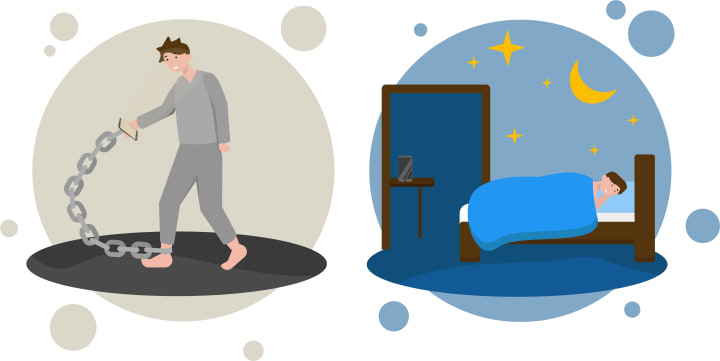
4 - Learn How To Use Your Phone
Have you ever heard of the term "nomophobia"? If you haven't, nomophobia is defined as the "fear or anxiety caused by not having a working mobile phone". According to some studies, 75.4% of users admit to being addicted to their smartphones. Smartphone addiction in turn is linked to depression, stress, and sleep loss.
Now although correlation is NOT causation - in other words, just because two phenomena are linked does not mean that one is the cause of the other - it's easy to see that the obsession with which we constantly check our phones is neither healthy nor normal. And it's not really our fault: every time we hear a ding or feel the slightest vibration in our pocket, something is in store for us: it may be good news or it may be bad news. The extremely powerful principle behind it is known as variable reward. It's often seen in action in slot machines (the user doesn't know how many times he has to pull the lever before winning), video games (the player doesn't know what a particular reward is), and many more addictive experiences. But at the end of the day, when the desired outcome is encountered - after many spam email notifications you finally receive your crush's text, after countless losing streaks you hit the jackpot, etc.. - the result is inevitably, always, just the same: dopamine rush.
Aaaaand you're hooked.
Key Takeaway: our phones can be highly addictive. They distract us and their unbalanced use is linked with anxiety and depression.
Actionable Steps: try allocating times throughout your day (or if you're feeling Bear Grylls-like adventurous, allocate an entire day) where you're not with your phone or it's in Do-Not-Disturb mode. Try to keep your phone beyond reach when you go to sleep.
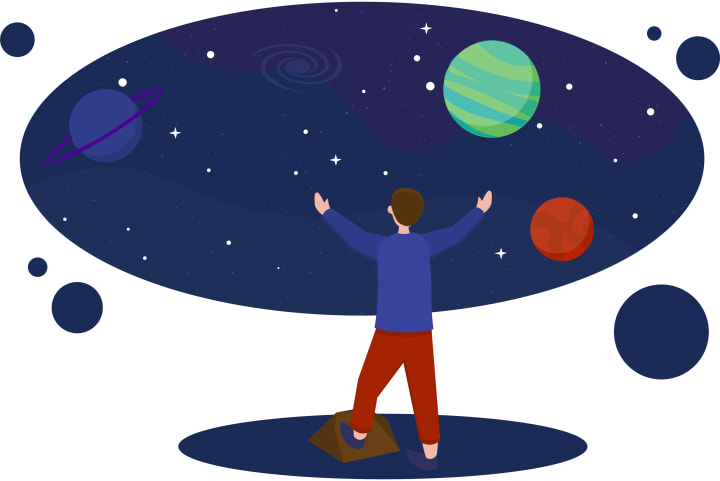
5 - Learn How To Fill Your Spiritual Need
It's very likely that if you're asked to think of an "intelligent person", the first person that comes to mind might be a famous mathematician, physicist, or anyone who excels in some scientific field. The point is that generally speaking, society has a pretty narrow definition of intelligence. In his book "Frames of the Mind: The Theory of Multiple Intelligences", psychologist Howard Gardner explains that we have multiple kinds of intelligence, such as:
- Naturalistic intelligence: think of it as the inner "green thumb" certain people seem to have. Sensitivity to subtle changes in nature.
- Musical intelligence: sense of rhythm and the ability to recognize tone, pitch along with a general sensibility to sound
- Logical-mathematical intelligence: this is the one we tend to associate with the general concept of intelligence we talked about before. Ability to naturally recognize patterns and inclination to break down processes and problems in a logical manner.
- Interpersonal intelligence: ability to easily get on well with others and reading people.
- Linguistic intelligence: ability to understand and use spoken and written language and to express thoughts effectively.
- Bodily-kinesthetic intelligence: sense of timing and great mind-body coordination.
- Intra-personal intelligence: ability to understand one's feelings, emotions, and thoughts.
- Spatial intelligence: ability to solve problems of navigation, visualization of objects from different angles and space, faces or scenes recognition, or to notice fine details.
- Existential intelligence: capacity to ponder over the significance of life, the meaning of death, the ultimate fate of the physical and the psychological worlds.
Everyone has, in different measures, ALL of the above-mentioned kinds of intelligence. What does this really-longer-than-needed introduction have to do with "spiritual need" or happiness? I'm glad you asked! The answer is that many of us are so caught up in filling our material needs (providing food, shelter, clothing, latest iPhone & shiny car) that we forget that humans have a spiritual need as well, which is reflected in our existential intelligence. We are naturally inclined to inquire about deep questions such as: Why are we here? What is the purpose of life?
Failing to recognize such a need, or simply dismissing it as frivolous can lead to feelings of emptiness and overall unhappiness. You may be working really hard to put a roof on your head, eat, have fun, and generally live a comfortable life, but what's the point of all that work if you're not sure why you're alive in the first place?
On the other hand, taking time to acknowledge and identify our spiritual layer and working towards making some sense of these life-defining questions can help you stop surviving and start living.
Key Takeaway: Living in a world focused on what you can see and touch, it's easy to forget that humans have an invisible, spiritual need that is just as important as our material one.
Actionable Steps: Try taking some time to look around. Take a moment to realize how absolutely incredible it is that you're alive on this beautiful planet. Next, ask yourself: why? Try listening to different points of view with an open mind and see what makes the most sense to you.
Wrapping Things Up
If you have reached this point, high five! Although this was by no means a complete and comprehensive list, I hope you learned at least one new thing, or that reading this article will give you the motivation to try and experiment with new habits in your life. I have added for each fact quoted, links to their sources, and more importantly, put a lot of ❤️in writing this. Hope to see you for part II 🚀
If you liked this article please feel free to talk to your grandma about it, send me a couple of bitcoin, do a backflip, or leave a comment in the section below :)
Originally published on byrsfl.co
About the Creator
Enjoyed the story? Support the Creator.
Subscribe for free to receive all their stories in your feed. You could also pledge your support or give them a one-off tip, letting them know you appreciate their work.






Comments
There are no comments for this story
Be the first to respond and start the conversation.